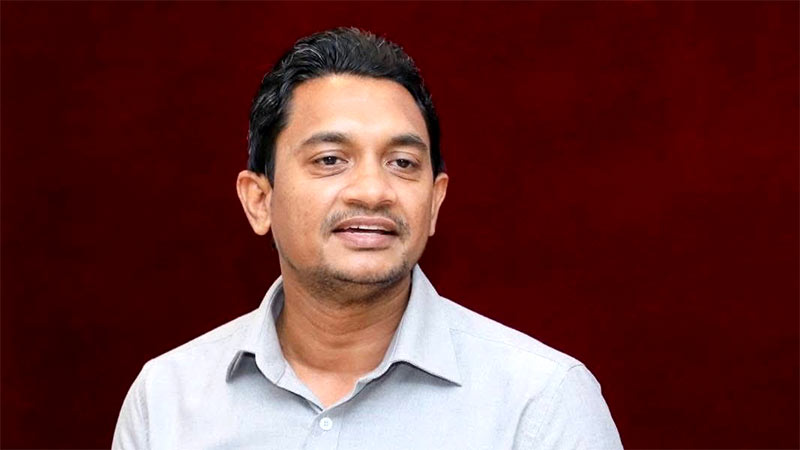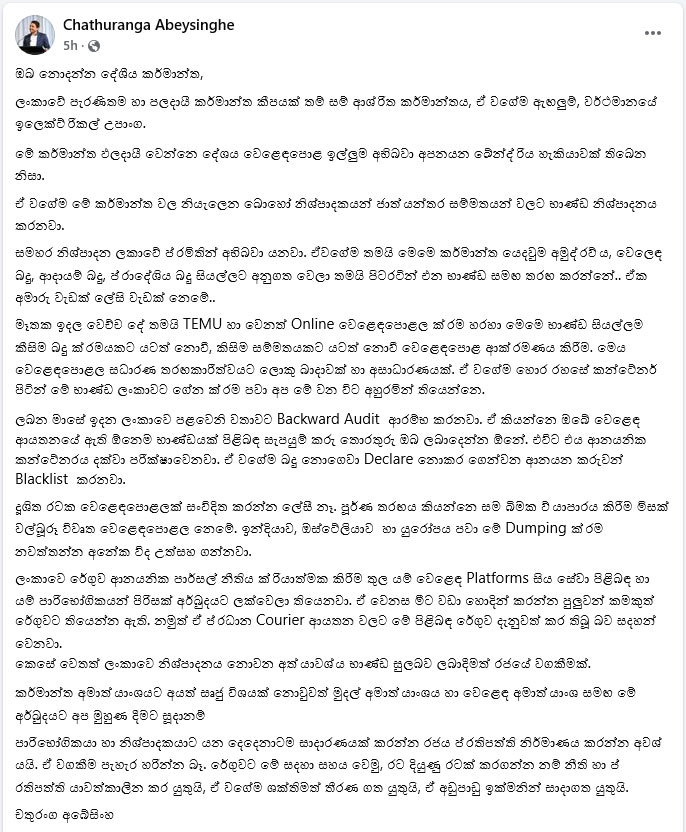Sri Lanka’s local industries at risk from tax-free online imports – Chathuranga

Chathuranga Abeysinghe, Deputy Minister of Industry and Entrepreneurship Development
Deputy Minister of Industry and Entrepreneurship Development, Chathuranga Abeysinghe, has raised serious concerns about the growing threat faced by Sri Lanka’s local industries due to tax-free imports entering the country through online platforms.
In a recent statement titled “The Local Industries You Don’t Know About,” the Deputy Minister emphasized that Sri Lanka’s long-standing industries including leather, garments, and, more recently, electrical equipment are not only meeting domestic needs but also emerging as strong contenders in the export market.
Many local manufacturers, he noted, are producing goods that meet or exceed international standards, despite bearing heavy costs such as raw materials, income taxes, trade duties, and various local levies.
Abeysinghe warned that unfair competition is becoming a major issue, as goods are being brought into Sri Lanka through platforms like TEMU and other online marketplaces without going through the proper tax system or quality control procedures. He described this situation as a “clear injustice” and a direct threat to fair market competition.
“Some importers are even using secret methods to bring entire containers of goods into the country, bypassing the tax system entirely,” he said.
To address this issue, the Deputy Minister announced a significant new measure: the launch of a “Backward Audit” system starting next month. Under this system, businesses will be required to disclose their suppliers for any product they sell. Authorities will then trace these suppliers back to the original import containers. If any goods are found to have been brought in without paying the proper taxes or without being declared, the responsible importers will be blacklisted.
Abeysinghe acknowledged that regulating markets in a country grappling with corruption is not easy, but stressed that true competition requires a level playing field. He noted that countries such as India, Australia, and those in Europe are already taking firm action to prevent such “dumping” practices.
He also addressed concerns raised by consumers and online sellers who have been affected by the stricter enforcement of customs laws on imported parcels. While admitting that improvements could be made in the implementation of these regulations, he stated that the main courier companies had already been informed of the changes by Customs.
The Deputy Minister further clarified that the government has a dual responsibility: not only to protect local producers, but also to ensure that essential goods not manufactured in Sri Lanka remain accessible to the public.
Although this issue does not fall directly under his ministry, he affirmed that the Ministry of Industry would work in coordination with the Ministry of Finance and the Ministry of Trade to address it.
“We need to update our laws and policies and take strong decisions if we want to become a developed country. Any shortcomings must be addressed without delay,” he said, urging the public to support Customs in its efforts.
Latest Headlines in Sri Lanka
- Sri Lanka President says true independence lies in economic freedom, unity February 4, 2026
- Sri Lanka grants special presidential pardon to 49 inmates February 4, 2026
- President Anura Kumara Dissanayake’s 78th National Independence Day message February 4, 2026
- Sri Lanka moves to strengthen fight against money laundering and terror financing February 3, 2026
- L.S.P. Jayaratne approved as Auditor General by Constitutional Council February 3, 2026



